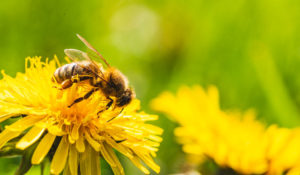
Have you ever wondered what our talented AirMD environmental testing experts do when they’re using their skills to conduct tests for asbestos, water quality testing, VOC testing or mold inspections? We may be science geeks, but that doesn’t mean we don’t enjoy hopping on a bike, enjoying a nice dinner on the town or catching a movie.
We do have one asbestos tester who is into apiculture, which is a fancy way of saying that he likes to keep bees. And he would like us to wish all of you a very happy National Honey Month.
What’s the Buzz?
Lots of people don’t like bees, which is really a shame. Honeybees are among the hardest working and most needed creatures on the planet. About a third of the food on your typical dinner plate couldn’t be produced without the pollinating efforts of bees.
But, while not everyone is interested in beekeeping, just about everyone is interested in the honey these busy little buzzers produce.
Honey not only tastes delicious, it offers a number of benefits, including:
- Honey is a source of vitamins, minerals and amino acids in honey. The National Honey Board also says that honey contains antioxidants as well as flavonoids and phenolic acids that act as antioxidants. “The amount and type of these compounds depend largely on the floral source,” the Honey Board says.
- Honey gives you energy. There are 17 grams of carbohydrates in a single tablespoon of honey. Those carbs provide the fuel you body needs.
- Honey makes you feel better. For centuries, people have been turning to honey when they have a cold. Research backs up this timeless wisdom. According to the National Honey Board, “Honey offers an effective and natural alternative to over-the-counter cough medicine. Though time is the most important healer of a sore throat, a spoonful of honey can help relieve the irritation,” they say.
In addition to being National Honey Month, September also happens to be the height of fall allergy season. Allergy sufferers may be disappointed to learn that the overlap is nothing more than a coincidence.
As the health experts at the Mayo Clinic tell us, there is no research to show that honey will ease your allergies. “The idea isn’t so far-fetched, though,” James T C Li, M.D., Ph.D., chair of the Division of Allergic Diseases in the Department of Internal Medicine at the Mayo Clinic and a board-certified asthma and allergy specialist. “Honey has been studied as a cough suppressant and may have anti-inflammatory effects.”
If you have questions about the health benefits of honey, check with your doctor. And if you have questions about testing the indoor air quality of your home or office, contact the environmental testing experts at AirMD.






